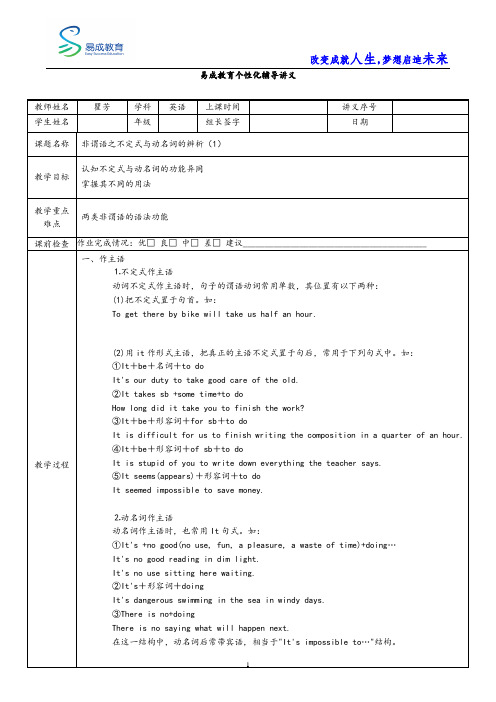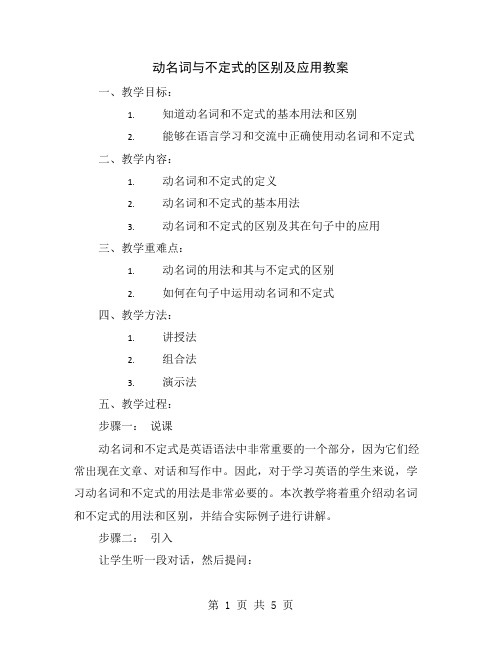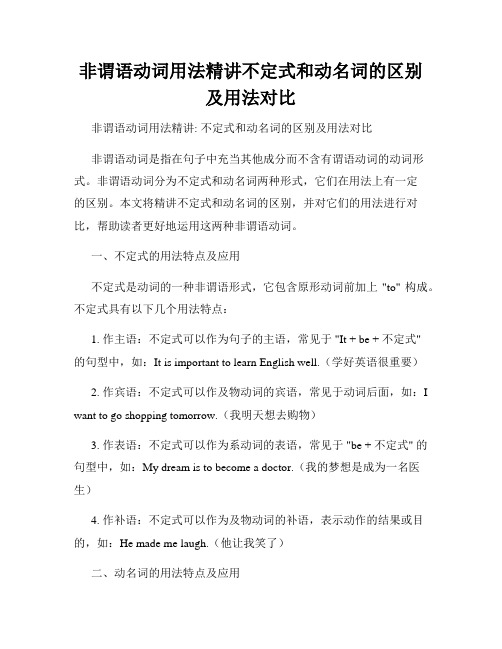不定式与动名词的区别讲课讲稿
《动名词和不定式》课件

C) We were studying.
3
填空练习
请用动名词或不定式填空:He enjoys ________ (swim/swimming) in the ocean.
改写句子
将句子 "He plays soccer every day." 改为使用动名词。
总结和要点
动名词
动词+ing形式,用作名词、 形容词和副词。
不定式是什么
1 定义
不定式是动词的原形加 上to构成的形式,它可 以作为名词、形容词和 副词。
2 例子
例如:to study, to eat, to go
3 用法
不定式可用作主语、宾 语、表语、定语和补语。
动名词与不定式的区别
1 形式
动名词是动词+ing形式,不定式是动词的原形+to。
2 用法
动名词常表示正在进行的动作,不定式一般表示一种动作、目的或意图。
《动名词和不定式》PPT 课件
本PPT课件介绍了动名词和不定式的基本概念和用法,旨在帮助学生更好地 理解和应用这两个语法结构。让我们一起探索它们的奥秘吧!
动名词是什么
1 定义
动名词是动词+ing形式,具有名词和动词的特点。
2 例子
例如:swimming, reading, playing
3 用法
动名词可用作主语、宾语、表语、定语和补语。
不定式
动词的原形+to,用作名词、 形容词和副词。
区别
动名词用于表示正在进行 的动作,不定式用于表示 一种动作、目的或意图ming. 不定式:She wants to go shopping.
动名词的用法
作主语
动名词和不定式

动名词和不定式动名词和不定式是英语语法中两个常见的非谓语动词形式。
它们在使用方式、功能和结构上有一些共同点,但也存在一些区别。
本文将就动名词和不定式进行详细介绍和比较,并探讨它们在句子中的不同用法。
一、动名词动名词是用动词的-ing形式作为名词使用。
它可以在句子中担任主语、宾语、表语、介词宾语、复合宾语等要素。
下面将从不同的角度来说明动名词的用法。
1. 动名词作主语动名词作主语时,通常表示一种习惯、经验、喜好或普遍现象等。
例如:- Smoking is harmful to your health.(吸烟对健康有害。
)- Dancing gives her joy.(跳舞使她快乐。
)2. 动名词作宾语常见的动词后面可以接动名词作宾语,例如:- He enjoys swimming in the river.(他喜欢在河里游泳。
)- She avoids doing her homework.(她避免做她的功课。
)3. 动名词作表语动名词还可以作表语,表示主语的行为或状态。
例如:- Her favorite activity is hiking.(她最喜欢的活动是远足。
)- The key to success is working hard.(成功的关键是努力工作。
)4. 动名词作介词宾语某些动词后面接介词,再接动名词作宾语。
例如:- She is thinking about going abroad.(她正在考虑出国。
)- He apologized for not attending the meeting.(他为没有参加会议而道歉。
)5. 动名词作复合宾语当动词后面接宾语和动名词时,宾语常常是指一个动作、情感或想法,而动名词则起到具体说明或解释的作用。
例如:- I like playing basketball.(我喜欢打篮球。
)- They hate doing household chores.(他们讨厌做家务。
人教版英语中考动词不定式与动名词用法说课稿

3.创设生活化的情境,让学生尝试用英语描述一些日常动作,从而引出本节课的主题:中考动词不定式与动名词用法。
(二)新知讲授
在新知讲授阶段,我将逐步呈现知识点,引导学生深入理解:
1.首先,介绍动词不定式和动名词的概念,通过示例句型让学生直观地了解它们的结构和用法;
2.任务驱动法:将学习任务分解为若干个子任务,引导学生自主探究和解决问题,提高学生的实践操作能力和解决问题的能力。
3.案例分析法:通过分析实际语境中的案例,帮助学生理解语法知识,培养学生分析问题和解决问题的能力。
4.小组合作法:鼓励学生进行小组讨论和合作,培养学生的团队协作能力和沟通能力。
(二)媒体资源
(二)学习障碍
在学习本节课之前,学生具备的前置知识包括动词基本用法、时态、语态等。然而,学生在学习本节课时可能存在以下障碍:
1.对动词不定式和动名词的概念理解不清;
2.难以区分动词不定式和动名词的用法;
3.在实际语境中,不知道如何正确运用动词不定式和动名词;
4.部分学生对语法学习缺乏信心,容易产生畏惧和抵触心理。
五、板书设计与教学反思
(一)板书设计
我的板书设计将遵循清晰、简洁、结构化的原则。板书布局分为三部分:左侧列出本节课的主要知识点,中间展示例句和关键语法结构,右侧用于记录学生的疑问和解答。
1.主要内容:左侧列出动词不定式与动名词的定义、结构、用法和区别;中间部分通过彩色粉笔突出显示关键句型和语法规则;右侧部分实时更新学生的疑问和教师的解答。
(五)作业布置
课后作业布置如下:
1.完成一份动词不定式与动名词用法的练习题,巩固课堂所学知识;
2.撰写一篇小短文,运用所学知识描述一个生活场景;
动名词和动词不定式课件

动名词用作形容词时,通常紧跟在动词之后,用于修饰名词 或代词,强调该名词或代词所代表的对象的特征或状态。例 如,“She is a good singer.”(她是一位优秀的歌手。)
02
动词不定式的定义和用法
作为主语
01
动词不定式作为主语,通常表示 一个具体的、尚未发生的动作或 行为。
02
翻译题
01
02
03
总结词
通过翻译练习,加深对动 名词和动词不定式的理解
题目1
他后悔没有听从老师的建 议。(翻译:He regretted not having followed the teacher's advice.)
题目2
我喜欢在周末去钓鱼。(翻 译: I enjoy going fishing on weekends.)
例如:He is the best person to do the job.(他是做这项 工作的最佳人选。)
用作副 词
动词不定式可以作为副词,修饰动词、形容词或副词,表 示程度、方式、时间等。
例如:She is too young to understand the meaning of the word.(她太年轻了,无法理解这个词的含义。)
动名词和动词不定 式课件
目 录
• 动词不定式的定义和用法 • 动名词和动词不定式的比较 • 动名词和动词不定式的特殊用法 • 练习与巩固
01
动名词的定义和用法
作为主语
总结词
动名词可以作为主语,表示抽象、泛指或一般的概念。
详细描述
动名词作为主语时,通常出现在句子的开始位置,用于表达某个动作或状态, 强调该动作或状态的意义和重要性。例如,“Smoking is harmful to health.”(吸烟有害健康。)
人教版英语中考动词不定式与动名词用法优秀教学案例

(二)过程与方法
1.采用任务型教学法,引导学生参与课堂活动,培养学生的合作意识和团队精神。
2.运用情境教学法,创设真实语境,提高学生运用动词不定式和动名词的交际能力。
3.采用启发式教学法,鼓励学生思考、探究,培养学生的创新精神和解决问题的能力。
4.运用对比分析法,帮助学生清晰地分辨动词不定式和动名词的用法及差异。
在教学过程中,我注重关注每一个学生的个体差异,充分调动他们的学习积极性,使他们能够在愉快的氛围中掌握动词不定式和动名词的用法。同时,我还注重培养学生的团队合作精神,让他们在小组活动中互相学习、互相帮助,共同提高英语水平。
三、教学策略
(一)情景创设
1.生活情境:通过展示日常生活中使用动词不定式和动名词的场景,如“我想去图书馆”(动名词),“我要看电影”(动词不定式),让学生在真实语境中感受和理解这两种词组的用法。
(五)作业小结
1.布置作业:设计一份作业,要求学生运用动词不定式和动名词完成句子构建,如:用动词不定式和动名词完成描述日常活动的句子。
2.教师提醒学生在完成作业过程中注意运用所学知识,如:正确选择动词不定式和动名词的形式、功能等。
3.鼓励学生在课堂上分享自己的作业成果,互相评价,共同提高。通过本节课的教学内容与过程,学生能够系统地掌握动词不定式和动名词的用法,提高他们在实际语境中的运用能力。同时,通过小组讨论、总结归纳等环节,培养学生的团队合作精神,提高他们的口语表达能力和自主学习能力。
(一)导入新课
1.利用多媒体展示一幅图片,图片中包含一个使用动词不定式和动名词的场景,如:“一个人正在图书馆看书”(动名词),“一个人想要去看电影”(动词不定式)。
动词不定式和动名词讲解

动词不定式和动名词的句法功能比较:一、作主语⒈不定式作主语动词不定式作主语时,句子的谓语动词常用单数,其位置有以下两种:(1)把不定式置于句首。
如:To get there by bike will take us half an hour.(2)用it作形式主语,把真正的主语不定式置于句后,常用于下列句式中。
如:①It+be+名词+to doIt's our duty to take good care of the old.②It takes sb+some time+to doHow long did it take you to finish the work?③It+be+形容词+for sb+to doIt is difficult for us to finish writing the compositionin a quarter of an hour.④It+be+形容词+of sb+to doIt is stupid of you to write down everything the teachersays.⑤It seems(appears)+形容词+to doIt seemed impossible to save money.⒉动名词作主语Learning without practice is no good.动名词作主语时,也常用It句式。
如:①It's +no good(no use,fun,a pleasure,a waste of time)+doing…It's no good reading in dim light.It's no use sitting here waiting.②There is no+doingThere is no saying what will happen next.在这一结构中,动名词后常带宾语,相当于"It's impossible to…"结构。
动词的不定式与动名词的区别

动词的不定式与动名词的区别动词的不定式(infinitive)和动名词(gerund)是英语中两种常见的非谓语动词形式。
尽管在形式上它们有一些相似之处,但在用法和含义上有明显的区别。
本文将详细介绍动词的不定式和动名词的区别,以便读者更好地理解和运用它们。
一、形式上的区别1. 动词的不定式通常由“to + 动词原形”构成,例如:to learn,to eat,to go等。
2. 动名词则是在动词原形后面直接加上-ing,例如:learning,eating,going等。
二、用法上的区别1. 主语的区别:a) 不定式作为主语:不定式一般用作主语时,表示一种抽象的行为、概念或目的。
例如:- To learn a new language is challenging.(学一门新语言很有挑战性。
)b) 动名词作为主语:动名词用作主语时,表示一种具体的、实际的行为或活动。
例如:- Reading helps expand your vocabulary.(阅读有助于扩大你的词汇量。
)2. 宾语的区别:a) 不定式作为宾语:不定式可以作为及物动词或不及物动词的宾语,常用于某些动词后,例如:want,hope,decide等。
例如: - She wants to learn Chinese.(她想学中文。
)b) 动名词作为宾语:动名词一般用作及物动词的宾语,常用于某些动词后,例如:enjoy,like,dislike等。
例如:- He enjoys swimming in the ocean.(他喜欢在海里游泳。
)3. 表语的区别:a) 不定式作为表语:不定式可以用作表语,通常用于表示完成、未来或可能性等。
例如:- His dream is to become a doctor.(他的梦想是成为一名医生。
)b) 动名词作为表语:动名词不常用作表语。
4. 定语的区别:a) 不定式作为定语:不定式可以用作修饰名词或代词的定语,常用于表示目的、原因或解释等。
“高中英语课件:动名词和不定式”的教学设计

不定式被动式的构成
将助动词be放在不定式前面,构成不定式被动态。
高中英语课件:动名词和 不定式的教学设计
本次课程将深入介绍动名词和不定式的知识点,帮助学生掌握正确的使用方 法。通过课堂互动和练习题,学生将更好地理解和掌握这些语法要点。
什么是动名词
动名词构成
将动词+ing,表示正在进行的动 作。
注意事项
动名词不一定是动词的主语,更 多时候作宾语或者介词宾语。
实例演练
举例解释动名词的构成和用法, 并与学生探讨有关细节。
动名词与动词不定式的区别
定义
动名词表示正在进行的动作,而不定式表 示更为笼统和抽象的概念。
用途
两者的用法与语态、时态和语气都存在较 为显著的差异,需要精准使用。
演练
引导学生进行相关练习,巩固对动名词和不定式的区别掌握。来自动名词作主语1
动名词作主语的构成
将动名词放在句首,表达主语的含义。
2
实例解析
提供实例句并进行演练,以帮助学生更好地理解和运用该用法。
3
参考范例
通过示例展示作为主语的动名词用法,举一反三的拓展相关知识点。
动名词作宾语
动名词作宾语的构成
示例演示
将动名词放在动词后面充当宾语, 表达被动的含义。
提供实例句并进行解析,引导学 生从具体例子中理解该知识点的 用法。
定义及作用
形容词后面的动名词表示表语补 足语,起到修饰形容词的作用。
实例演示
发放教材并配以示例句,让学生 明确该语法规则的使用方法和注 意事项。
小试牛刀
引导学生识别并构造句子,练习 使用形容词后面的动名词。
动名词作宾语补足语
1
宾语补足语的定义
非谓语之不定式与动名词的辨析(1)

易成教育个性化辅导讲义教师姓名瞿芳学科英语上课时间讲义序号学生姓名年级组长签字日期课题名称非谓语之不定式与动名词的辨析(1)教学目标认知不定式与动名词的功能异同掌握其不同的用法教学重点难点两类非谓语的语法功能课前检查作业完成情况:优□良□中□差□建议__________________________________________教学过程一、作主语⒈不定式作主语动词不定式作主语时,句子的谓语动词常用单数,其位置有以下两种:(1)把不定式置于句首。
如:To get there by bike will take us half an hour.(2)用it作形式主语,把真正的主语不定式置于句后,常用于下列句式中。
如:①It+be+名词+to doIt's our duty to take good care of the old.②It takes sb +some time+to doHow long did it take you to finish the work?③It+be+形容词+for sb+to doIt is difficult for us to finish writing the composition in a quarter of an hour.④It+be+形容词+of sb+to doIt is stupid of you to write down everything the teacher says.⑤It seems(appears)+形容词+to doIt seemed impossible to save money.⒉动名词作主语动名词作主语时,也常用It句式。
如:①It's +no good(no use, fun, a pleasure, a waste of time)+doing…It's no good reading in dim light.It's no use sitting here waiting.②It's+形容词+doingIt's dangerous swimming in the sea in windy days.③There is no+doingThere is no saying what will happen next.在这一结构中,动名词后常带宾语,相当于"It's impossible to…"结构。
动名词与不定式的区别及应用教案

动名词与不定式的区别及应用教案一、教学目标:1.知道动名词和不定式的基本用法和区别2.能够在语言学习和交流中正确使用动名词和不定式二、教学内容:1.动名词和不定式的定义2.动名词和不定式的基本用法3.动名词和不定式的区别及其在句子中的应用三、教学重难点:1.动名词的用法和其与不定式的区别2.如何在句子中运用动名词和不定式四、教学方法:1.讲授法2.组合法3.演示法五、教学过程:步骤一:说课动名词和不定式是英语语法中非常重要的一个部分,因为它们经常出现在文章、对话和写作中。
因此,对于学习英语的学生来说,学习动名词和不定式的用法是非常必要的。
本次教学将着重介绍动名词和不定式的用法和区别,并结合实际例子进行讲解。
步骤二:引入让学生听一段对话,然后提问:-A: What do you like doing in your free time?-B: I like to read books and go hiking.-A: Oh, I like reading too. But I prefer watching movies.引入这段对话是为了让学生看到动名词和不定式的应用,并引出下一个问题:在这个句子中,“reading”和“to read”有什么区别?步骤三:详细讲解动名词的用法:动名词是动词+“-ing”,它可以表示以下意思:1.表示某种活动或正在做某事-I enjoy swimming in the sea.-He hates shopping with his wife.2.表示某物的特定用途或功能-The scissors are for cutting paper.-The rope is for tying things up.3.作为名词的补语-His favorite hobby is playing soccer.-My dream is traveling around the world.4.作为介词后的宾语-She’s thinking about studying abroad next year.-Have you ever thought about going to Japan?不定式的用法:不定式是由“to”加上动词原形组成,它可以表示以下意思:1.表示将要做某事或计划去做某事-I’m going to visit my grandparents tomorrow.-She wants to be a doctor when she grows up.2.表示能力或意愿-He can't swim yet, but he wants to learn.-She would like to go to the cinema tonight.3.作为形容词或介词后的宾语-I have a lot of things to do tomorrow.-It's difficult to speak a foreign language fluently.动名词和不定式的区别:1.动名词可以作主语、宾语和表语,不定式只能作宾语。
非谓语动词用法精讲不定式和动名词的区别及用法对比

非谓语动词用法精讲不定式和动名词的区别及用法对比非谓语动词用法精讲: 不定式和动名词的区别及用法对比非谓语动词是指在句子中充当其他成分而不含有谓语动词的动词形式。
非谓语动词分为不定式和动名词两种形式,它们在用法上有一定的区别。
本文将精讲不定式和动名词的区别,并对它们的用法进行对比,帮助读者更好地运用这两种非谓语动词。
一、不定式的用法特点及应用不定式是动词的一种非谓语形式,它包含原形动词前加上 "to" 构成。
不定式具有以下几个用法特点:1. 作主语:不定式可以作为句子的主语,常见于 "It + be + 不定式"的句型中,如:It is important to learn English well.(学好英语很重要)2. 作宾语:不定式可以作及物动词的宾语,常见于动词后面,如:I want to go shopping tomorrow.(我明天想去购物)3. 作表语:不定式可以作为系动词的表语,常见于 "be + 不定式" 的句型中,如:My dream is to become a doctor.(我的梦想是成为一名医生)4. 作补语:不定式可以作为及物动词的补语,表示动作的结果或目的,如:He made me laugh.(他让我笑了)二、动名词的用法特点及应用动名词是动词的一种非谓语形式,它以动词的ing形式作为基础,可以用作名词的性质。
动名词具有以下几个用法特点:1. 作主语:动名词可以作为句子的主语,表示某个动作、状态或经历,如:Swimming is good for health.(游泳对健康有好处)2. 作宾语:动名词可以作及物动词的宾语,常见于动词后面,如:She enjoys reading books.(她喜欢看书)3. 作表语:动名词可以作为系动词的表语,常见于 "be + 动名词" 的句型中,如:His hobby is playing basketball.(他的爱好是打篮球)4. 作宾补:动名词可以作及物动词的宾语补足语,表示动作的结果或目的,如:I heard him singing in the room.(我听到他在房间里唱歌)三、不定式与动名词的用法对比1. 用作主语时:不定式通常表示普遍的、一般性的动作,动名词通常表示具体的、具体的动作或习惯性的动作。
动词不定式和动名词的用法和区别详解

动词不定式和动名词的用法和区别详解动词不定式是由动词原形加上to构成的形式,通常作为动词、形容词或副词的宾语、补语、定语或状语。
动词不定式可以表示目的、结果、愿望、能力、需要、义务等含义。
动名词是由动词加上-ing构成的形式,可以作为名词的主语、宾语、定语或表语。
动名词通常表示行为或状态的持续性或重复性。
两者的区别如下:1. 形式上的区别:- 动词不定式以to开头,如to eat、to sleep。
- 动名词以-ing结尾,如eating、sleeping。
2. 用法上的区别:- 动词不定式通常用作动词的宾语,如I want to eat。
它可以跟在某些动词后面,如want、like、hope等,构成不定式短语。
- 动名词通常可以用作名词的主语、宾语或表语,如Smokingis bad for health。
3. 意义上的区别:- 动词不定式强调的是动作的目的、结果、愿望、能力等。
例如,I want to learn English。
在这个句子中,不定式to learn强调的是想要研究英语的目的。
- 动名词强调的是动作的持续性或重复性。
例如,I enjoy swimming。
在这个句子中,动名词swimming强调的是游泳这个持续性的动作带来的愉悦感。
需要注意的是,有些动词后既可以接动词不定式,也可以接动名词,但意义可能会有所不同。
例如,I like swimming和I like to swim的意思虽然都是“我喜欢游泳”,但前者强调的是游泳这个动作本身,而后者强调的是我想要做游泳这个动作。
总结起来,动词不定式和动名词在形式、用法和意义上存在一些区别。
了解这些区别有助于我们正确使用它们,并更好地理解英语句子的含义和表达方式。
参考资料:- 李强,牛津英语语法详解,外语教学与研究出版社,2001年。
初中英语动词不定式和动名词的辨析PPT课件

Exercises
1. -- You’ve done very well this time. -- It’s really kind ____C__. A. for you to say so B. for you saying so C. of you to say so D. of you saying so
既可以接动词不定式又可以接动名词的动词
1. forget to do sth forget doing sth
2. remember to do sth remember doing sth
3. regret to do sth regret doing sth
4. try to do sth try doing sth
5. My father hates(痛恨) __D_. He never allows me _____. A. to smoke; to smoke B. smoking; smoking C. smoke; smoking D. smoking; to smoke
6. The girl was beginning _B__. A. get angry B. to get angry C. getting angry D. angry
2. It is better to lose one’s life than __C__. A. if you lose your spirit B. losing his spirit C. to lose one’s spirit D. your spirit getting lost
3. – I can’t work in this way. -- Why not __A__ it in some other way? A. try to do B. try doing C. trying to do D. trying doing
动词不定式和动名词说课讲解

动词不定式和动名词动词不定式和动名词一、动词不定式用法动词不定式没有人称和数的变化,在句中不能独立作谓语。
但动词不定式具有名词、形容词和副词特征,在句中可以作主语、宾语、宾语补足语、定语、表语和状语等多种成分。
另外,动词不定式具有动词特点,可以有自己的宾语和状语,组成动词不定式短语。
动词不定式的肯定形式是to+do;其否定形式是not to+do。
下面以动词不定式在句中的作用来予以详细说明。
1.作主语可以直接作主语。
如: To see is to believe.(1)但在英语中,常用it作形式主语,真正的主语即动词不定式放在后面。
如: It's wrong to play tricks on other people. It's our duty to keep our environment clean and tidy.点击规律:动词不定式在句中作主语时,常放在It is +adj.(形容词)+to do sth.或 It is +n.(名词)+to do sth.句型中,it仅作形式主语。
(2)如果要表示不定式动作的执行者,就在It + be +形容词+to do sth该句型中的不定式之前加for sb或of sb。
①在形容词hard, difficult, easy, necessary, important, impossible, good, helpful, useful, dangerous, safe等之后常用for sb,即构成句型:It + be + 形容词+for sb to do sth。
e.g. It’s not easy for us to learn a foreign language well.It’s dangerous for you to swim in the river.该句型中的形容词修饰的是不定式,强调的是做某事怎么样。
②在形容词nice, kind, clever, foolish(愚蠢的), polite(有礼貌的), careless, careful等之后,常用of sb,即构成句型:It + be + 形容词+of sb + to do sth e.g. It is very kind of you to help me. It was wrong of them to cut the trees.该句型中的形容词主要修饰人,表示某人的性质或特征,强调的是这个人怎么样。
- 1、下载文档前请自行甄别文档内容的完整性,平台不提供额外的编辑、内容补充、找答案等附加服务。
- 2、"仅部分预览"的文档,不可在线预览部分如存在完整性等问题,可反馈申请退款(可完整预览的文档不适用该条件!)。
- 3、如文档侵犯您的权益,请联系客服反馈,我们会尽快为您处理(人工客服工作时间:9:00-18:30)。
动词不定式和动名词是英语非谓语动词的两个重要部分一、作主语1、不定式作主语:动词不定式可直接用作主语, 句子的谓语动词常用单数。
To get there by bike will take us half an hour.对于主语较长的不定式,可以用it作形式主语。
例如:It's our duty to take good care of the old. How long did it take you to finish the workIt is difficult for us to finish writing the composition in a quarter of an hour.It seemed impossible to save money. It's kind of you to help me with my English.2、动名词作主语:动名词也可直接用作主语,或者用it 作形式主语。
例如:Learning without practice is no good. It's no good reading in dim light. It's no use sitting here waiting. It's dangerous swimming in the sea in windy days. There is no saying what will happen next.3、动词不定式和动名词作主语的区别(1) 不定式作主语经常表示具体动作,或者表示将要进行的动作。
而动名词作主语经常表示抽象的一般性的动作。
例如:It's no good for you to eat so much fat. (有具体的人for you)It's no good eating too much fat. (泛指)(2) 不定式的逻辑主语常用of, for 表示;动名词逻辑主语则常用物主代词、名词、代词表示。
例如:It is stupid of you to write down everything the teacher says. (of you)It's no use your pretending that you didn't know the rules. (your)The doctor suggested them having their health check-up once a year.二、作宾语1、不定式作宾语(1) 以下动词后, 一般只用不定式作宾语.如:agree, attempt ,apply,ask, aim, arrange, beg,choose, decide, demand, expect, fail , help, hope, lean, long, manage, offer, plan, prepare, pretend, promise, refuse, wish afford等。
I decided to ask for my money back.I decided that I would ask for my money back.When our visit to the farm was over, we expected to start back on foot.When our visit to the farm was over, we expected that we would start back on foot.(2) 不定式可先用it 做形式宾语。
We think it quite important for us to learn a foreign language well.He feels it his duty to help the poor.2、动名词作宾语(1) 以下动词后, 一般只用动名词作宾语, 如:admit, appreciate, consider, delay, enjoy, finish, keep, imagine, mind, miss, practise, resist, risk, save, suggest, don't mind, give up, insist, on, put off 等。
I suggest spending our summer vacation in a seaside town.You must give up smoking, for it does too much harm to your health.(2) 介词后只能接动名词做宾语I should go to attend the birthday celebration instead of staying at home.What about inviting Li Jun to make a speech(3) 少数特殊结构中只用动名词做宾语。
它们可以看作是省略的介词的形式。
例如:have difficulty (in) doing sth. have no trouble (in) doing sth. lose no ti me (in) doing sth. prevent/stop…(from) doing sth.there is no use (in) doing sth.3、不定式与动名词做宾语的区别(1) 动词后是接不定式还是动名词作宾语,主要是根据使用习惯。
有些动词后一般只接不定式作宾语,而另一些则只用动名词作宾语。
详见上面的说明。
(2) 介词后只能接动名词作宾语;还有少数结构后只用动名词作宾语。
详见上面的说明。
(3) 在need, want, require 等后表示被动意义时,不定式要用被动语态,而动名词不需要。
例如:My bike needs to be repaired. My bike needs repairing.(4) 英语中,有些动词动词后既可接不定式也可接动名词,意义区别不大,如:begin, continue, start, hate, like, love, need, require, want 等. 但在下列情况下, 一般要用不定式: * would(should) 与hate, like, love 连用时:I'd like to have a cup of coffee.*当begin, continue, start 等是进行式时The students are starting to work on the difficult maths problem.*当begin, continue, start与know, understand 等连用时:I soon began to understand what was happening.4、部分动词后接不定式或动名词时, 意义差别较大。
(1) forget, remember, regret 后接不定式, 表示现在或未来的动作, 接动名词表示动作已经发生。
如:Don't forget fo post the letter for me. (信还没有寄出)Have you forgotten meeting her in Beijing Airport (已见过她)Remember to close the windows before you leave. (窗户还没有关)I remember writing him a letter a year ago. (信已写过)We regret to tell you that all of you are not invited to attend the meeting.They regretted ordering these books from abroad.(2) mean to do 打算做某事/ mean doing 意味着……I meant to catch up with the early bus.This means wasting a lot of money.(3) try to do 设法尽力做某事/ try doing 试着做某事You should try to overcome your shortcomings.Try working out the physics problem in another way.(4) stop to do 停下当前事去做另一件事/ stop doing 停止当前事On the way to the airport, I stopped to buy a paper.You'd better stop arguing and do as you are told.(5) can't help doing 禁不住……/ can't help to do不能帮助干……They couldn't help jumping up at the news.Sorry I have lots of work to do. So I can't help to make up the roomfor you.(6) go on to do 去做另外一件/ go on doing 继续做此事He went on to talk about world situation.他接着又谈了世界形势.We'll go on fighting so long as there is oppression in the world.(7) leave off to do 去做另外一件事/ leave off doing 停下当前事It's time to leave off talking and to start acting.They left off to go fishing.三、做表语不定式作表语表示具体动作或将来动作; 动名词作表语表示抽象的一般行为。
To be kind to the enemy is to be cruel to the people.My chief purpose is to point out the difficulties of the matter.What I would suggest is to put off the meeting. Our work is serving the people. What he likesis taking a walk after supper. The story told by Mr. Wang is interesting.四、作定语1、不定式作定语时,放在被修饰的名词之后。
